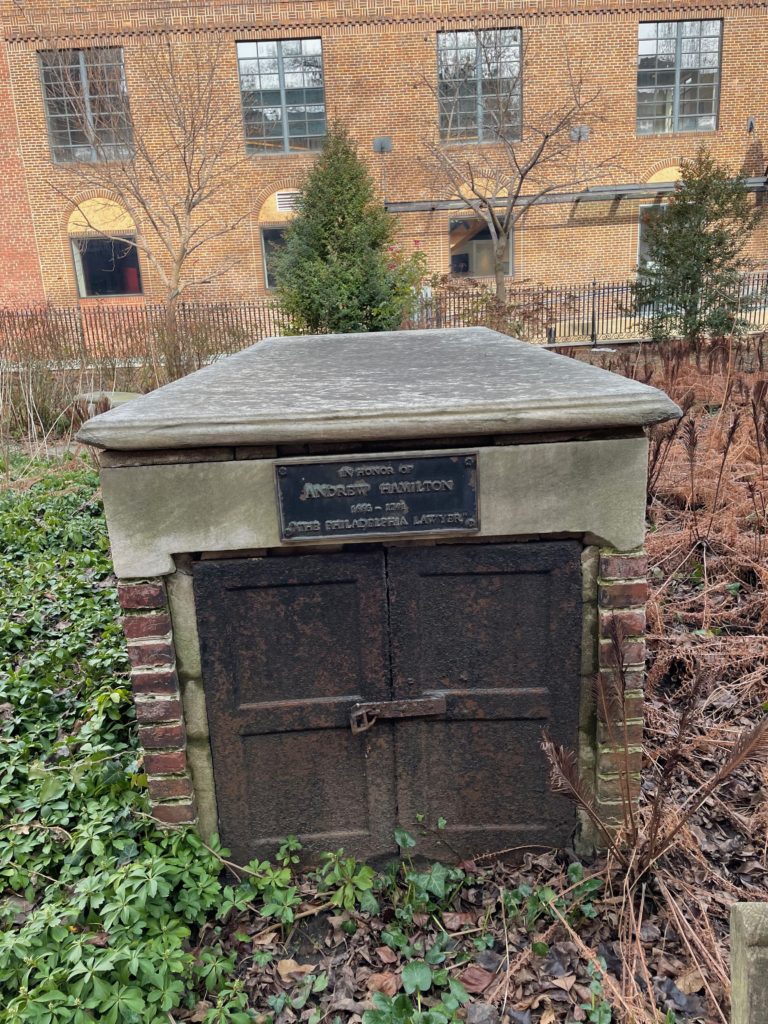Erik Visits an American Grave, Part 1,047
This is the grave of Andrew Hamilton.

So you’ve heard the term “Philadelphia Lawyer.” In the 20th century, that generally meant a version of sketchy ambulance chaser, a Saul Goodman if you will. Well, the term actually has a root and it comes from Andrew Hamilton.
Born sometime around 1676 in Scotland, Hamilton’s past was sketchy, at least to the point that he refused to reveal any information about anything that happened to him before he came over the colonies. So we don’t know much including his actual date of birth. Some have speculated that is because his family was involved in the Jacobite Rising of 1689. In any case, he was highly educated. He moved to Virginia in 1697 to study law and teach school. He then ran a plantation owned by one of his former students. When that student died, he married the widow. That made him rich. He also began practicing law around the mid-1700s. So he was a rising star in the colonial world. In 1708, he bought a big ol’ plantation in Maryland that of course included slaves. He kept his Virginia plantation too. He practiced law in both colonies.
By 1712, he was a big enough deal in the colonies that he traveled to London to be admitted to the bar there and thus represent Americans with the royal government. In fact, William Penn soon hired him to represent him in some land disputes over the boundaries of his colonies. He soon became the trusted lawyer to the Penn family. So now he was really elite. That also meant rising in the colonial political world. He was sent to the Maryland House of Delegates in 1715. Hilariously, he was actually arrested and fined for his slow response. He was at his plantation and didn’t hear about the selection in time to show up, which was against the law. His position was that how could I show up when my plantation is so far from Baltimore that transportation networks couldn’t get me the information? But it didn’t matter. Anyway, he was an influential legislator who led the creation of the Maryland legal code that lasted until the American Revolution.
In 1717, Hamilton decided to move to Philadelphia when the colony named him as its attorney general. He also had a private practice. He rose in that society as well and remained an official until 1724, when he went to London again to look after the Penn family interests. In 1727, back in Pennsylvania, he was elected to the colonial assembly and became its speaker in 1729. So this was a politically powerful figure. It was also Hamilton who built what became known as Independence Hall after the Declaration of Independence was written there, a half-century later. It was the legislative hall for the colony before that. Before it was built, the legislature just kind of met wherever, often in someone’s house. He was also part of the group designated to figure out the border between Pennsylvania and Maryland, which wasn’t truly surveyed until the Mason-Dixon Line was coined, but it still was a step forward in figuring this out.
If you know anything about Hamilton before this, it was probably his role in the Zenger case, probably the most important, or at least well-known, case coming out of colonial America. Zenger was a colonial printer charged with seditious libel after publishing a screed against the colonial governor creating new courts that he could control and outside of legislative approval. Hamilton was outraged that such a thing could happen so he offered his services to Zenger pro bono. He was such a good lawyer that he convinced the jury, with what was reported to be a passionate speech, that the actual truth of the allegations were not particularly important here because the definition of seditious libel was not about truth at all but about power and that it also originated in the British Star Chamber, loathed by most colonialists. So they found Zenger not guilty and it was a major blow in favor of free speech and freedom of the press at a time when these were pretty new concepts.
For all his skill, he became known as the “Philadelphia Lawyer” and then that morphed into a name for a successful attorney and then for a sketchy attorney. Interesting that it is still at least sort of in the language, though not nearly as much now as, say, when Woody Guthrie wrote the song by that title. For the rest of his life, Hamilton held offices in Pennsylvania and mentored the next generation of colonial legal leaders, while also building himself a nice big house on a huge property outside of Philadelphia.
Hamilton died in 1741, approximately 65 years old.
Andrew Hamilton is buried in Christ Church Episcopal Cemetery, Philadelphia, Pennsylvania. This is not his original grave site. He was initially buried on his plantation. But sometime in the early 19th century, his descendants sold the estate and he was moved to town.
If you would like this series to visit other American lawyers, you can donate to cover the required expenses here. Usually the lawyers here are more famous for their political activities, but in Hamilton’s case, it was the law that made him famous. Johnnie Cochran is in Inglewood, California and Joe Jamail is in Houston. Previous posts in this series are archived here.
